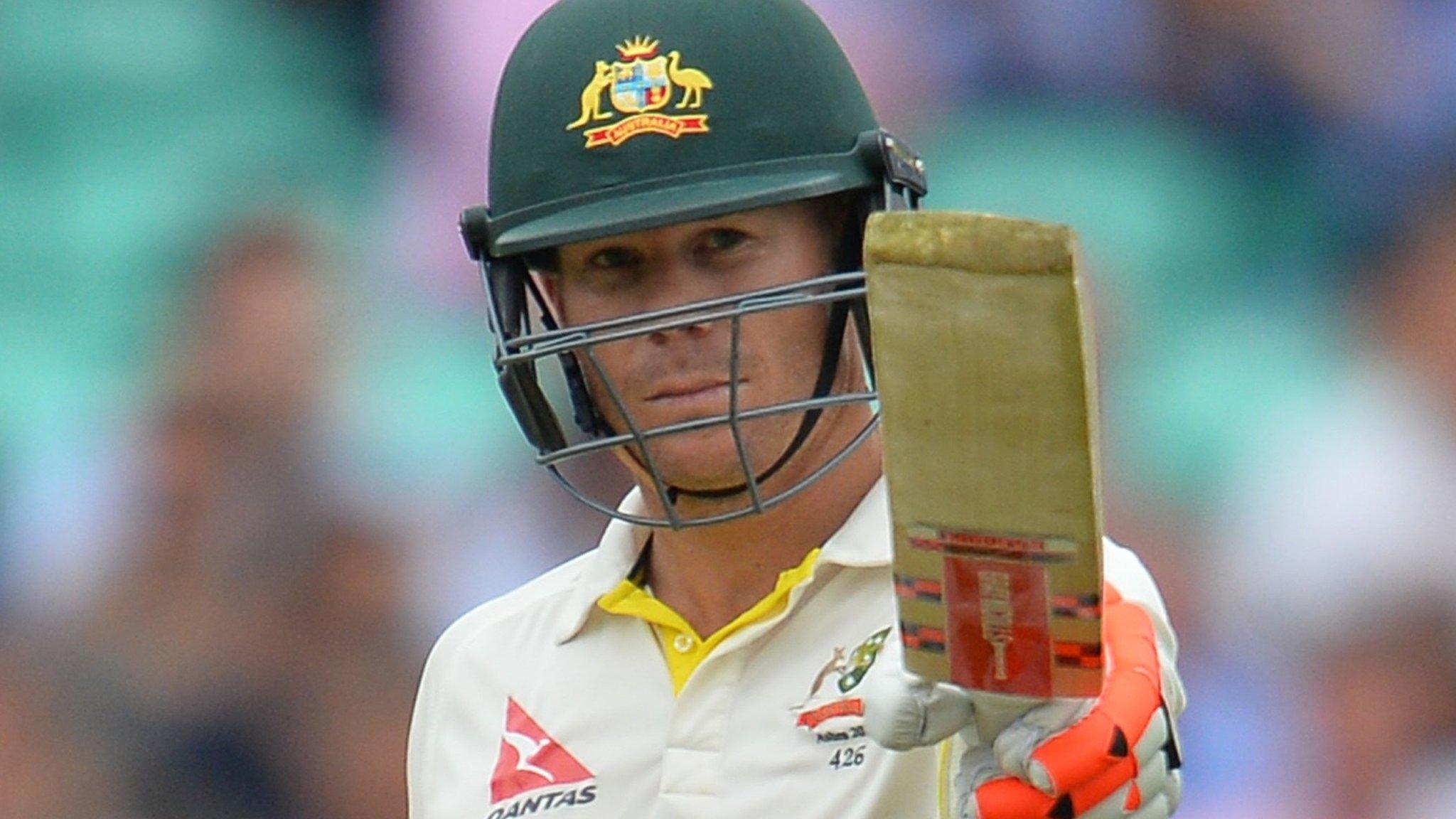Jonny Bairstow on his dad, Cape Town, Geoffrey Boycott and Jonny Wilkinson
- Published
Jonny Bairstow talks to the BBC's Joe Wilson
Even for an international sportsman, Jonny Bairstow's story is extraordinary.
That the Yorkshireman has had his share of setbacks on the way to becoming one of the leading wicketkeeper-batsmen in the world, or that the young Bairstow was an extremely talented footballer and rugby player are noteworthy, but only a small part of his tale.
Jonny's father David, also a wicketkeeper, had a 20-year career with Yorkshire and played four Tests for England. In 1998, he took his own life.
To mark the release of his autobiography, A Clear Blue Sky, Bairstow spoke to former England captain Michael Vaughan for a BBC Radio 5 live special.
He talks openly about his father, his family, his emotional maiden Test century in Cape Town, thoughts of quitting cricket to play rugby and what it is like to spend Christmas at Geoffrey Boycott's house.
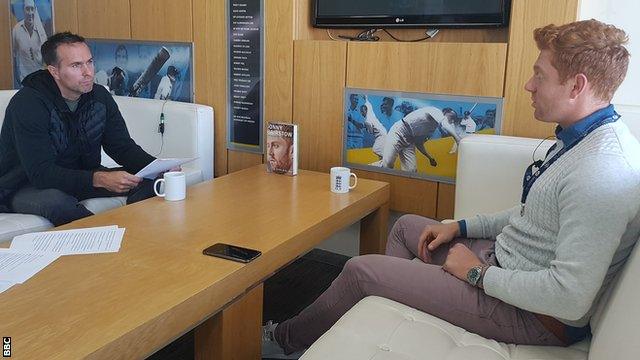
Jonny Bairstow played in Michael Vaughan's final first-class match in 2009
'We went to school the next day'
Suffering from depression, worried about money and facing a drink-driving charge, David Bairstow ended his own life at the age of 46.
He was discovered by eight-year-old Jonny, his younger sister Becky and their mother Janet, who at the time was undergoing treatment for breast cancer.
"Me and my sister were both very young. In some ways, yes, you do remember everything that went on because it is only us who will remember that. At the same time there are bits of it you choose not to remember, that you choose to park.
"We went to school the next day. For me, that was really powerful. It was mum's way of dealing with it, her way of saying 'yes, that's happened now, but we have to deal with it in a certain way'.
"It makes you grow up very quickly. There's a huge sense of realisation around everything. At the same time, when you're eight years old, you don't really know everything that's happened. You understand it a bit, but you don't understand all of it.
"There are questions that are unanswered, but there's no point in revisiting those questions on a daily, weekly, monthly, or yearly basis. If you're constantly striving for questions that are never going to be answered, then you're only being detrimental to your own mental health.
"There are so many bits that I didn't know right away, but I've learned, even when I've been doing the book. Having a setback like that can make you mature very quickly."
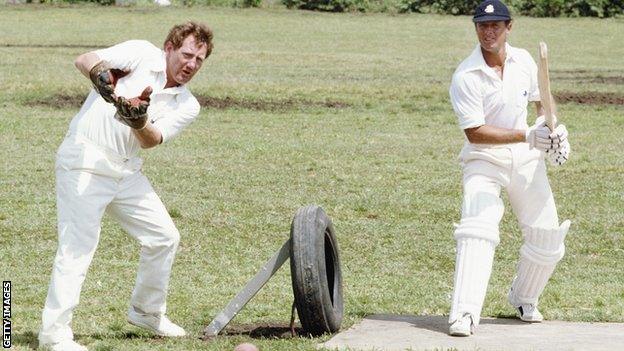
David Bairstow (left) on tour with Geoffrey Boycott in 1981
By taking his own life, David nullified his life insurance policy. In his autobiography, Jonny explains that he knew money was sometimes tight when he was growing up.
"That's why it's been so good to keep pushing forward and represent England, to make Mum proud for the days she took to me to train with Leeds United, three times a week from the age of seven to 15, as well as bringing me to Headingley, looking after my sister, taking us to school and feeding us.
"If you stack everything that Mum did with the help of Grandma and Grandpa and all of our friends, it was ridiculous, absolutely ridiculous.
"Mum never made an excuse, even when she had cancer and had a lot on her plate. You have to have huge admiration for the way she brought us up. Hopefully she has brought two role models into the world.
"You think of what might have been different if dad had been around, or how I might have turned out as a person. You just don't know. I might not even be playing cricket.
"There will have been questions along the way, but there's not just one, because there's 20 years of learning off dad that I haven't had.
"If he was here now, I think he'd just tell me to keep going."
Cape Town
Bairstow made his Test debut in 2012 and, despite making 95 in his fourth match against South Africa, needed more than three years to earn a regular spot in the England side.
When Bairstow faced South Africa again, he once more found himself on 95, this time at lunch on the second day of the second Test in Cape Town.
"I was dripping wet. I didn't take my pads off, I didn't eat, I just sat there saying 'it's not happening again'.
"I knew they would start with Morne Morkel after lunch, but when they then used the medium-pace of Stiaan van Zyl, I just wanted him to bowl a short, wide one.
"Getting to that first hundred was just a relief. I was five short four years earlier, so it was four years of questions. Will I get the opportunity again? What could have I achieved if I had made that ton?"
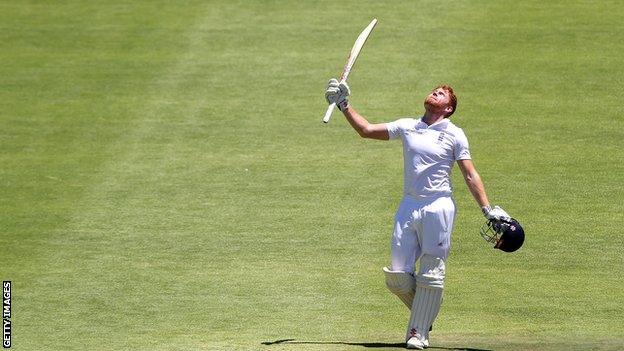
Bairstow reached his maiden Test century in his 22nd match
The roar that Bairstow let out when he reached three figures could be heard all around Newlands and was followed with a look to the sky. On Test Match Special, an emotional Jonathan Agnew said: "You won't find a more popular individual. You can't resist the thought of his father looking down and how proud he would be."
"The years of waiting really came through. I don't know how I celebrated, I just ran and shouted. I welled up and got a jittery bottom lip. There was a huge heap of emotion. It's a very, very proud moment.
"There were more tears when I saw my mum and Becky at the end of the day. There's never anything wrong with shedding a tear.
"There's all the time which you spend thinking about it. Are you good enough? Will you get an opportunity? Where and when will it be? I have let myself and my family down by not getting a hundred already and there are people that have spent money coming to watch you.
"That makes you prouder. It reminds you that you're not only representing yourself, but your family and the people who have kept an eye on you throughout your career."
Christmas at Geoffrey's
David Bairstow was a close friend of Yorkshire and England batsman Boycott, whose relationship with the Bairstow family continued after David's death and to this day.
Boycott, who scored 8,114 runs in 108 Tests for England, remains a forthright pundit on Test Match Special and in his newspaper column.
"Geoffrey presented me with my cap on the day I made my England Test debut. He'd already presented a special cap to Ian Bell to mark his 75th Test. He said to him 'you're one of the best batsmen in the world, but please stop playing the sweep shot'. That got us all laughing.
"When it came for me to get my cap, I could feel myself going in the back of my throat and in my chest. I had to hold back a little bit. After the hundred in Cape Town, I did an interview with Geoffrey and got emotional then.
"I've perhaps not spoken about cricket enough with him. I've wanted to find it out for myself. Looking back, maybe I should have done it more, but that's my inner stubbornness. I knew that he was there if I needed to speak to him. If I picked up the phone right now, he would be there and would help me if he can.
"The opinions that he has do not cause a massive issue in the dressing room, especially with the group of players we have now. Something could be said that is too close to the bone, but players are close to pundits now - we see them every day and can speak to them for ourselves if we have an issue.
"He once nailed me in front of 400 people at a game at Abbeydale Park in Sheffield. Everyone knows the nature of what pundits do - they are paid to write columns and have opinions. I perhaps didn't realise that at the start and took too much criticism to heart.
"We've had Christmas at his house in South Africa. It's entertaining around the Boycott Christmas table - it's not just him talking about himself."
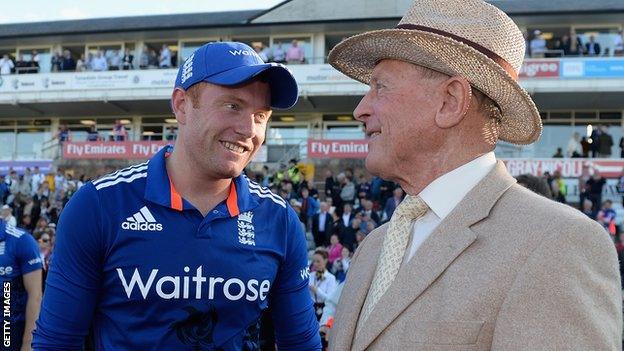
Bairstow has followed his father and Boycott by playing for Yorkshire and England
'I thought about giving up to play rugby'
In the autobiography, Bairstow reveals his admiration for rugby player Jonny Wilkinson.
In the aftermath of England's 5-0 whitewash on the 2013-14 Ashes tour of Australia, Bairstow, a fly-half in his youth, even thought of attempting to start a rugby career of his own.
"Wilkinson changed the game of rugby. He captivated so many kids. I used to watch his DVD when I went to bed on the night before rugby games and I got a real sense of inspiration.
"I looked at the way he trained, the way he prepared and how he never left the training ground until he was content.
"Before he retired, he took a team talk for Toulon in French and English. To be able to be an inspiration to your team-mates in two languages sums the bloke up.
"He got a lot of injuries. The mentality that he had to keep doing the rehab, to answer the questions that people posed of him when he kept coming back resonates with me very firmly.
"He put his body in places that he shouldn't have put his body. He did things that he knew he shouldn't be doing. He wanted to keep pushing.
"When you're going through difficult times, like I was after the 2013-14 Ashes, you start thinking about different bits. Rugby is a huge passion of mine, a lot of my friends play.
"When all the lads are throwing a ball around, you go and play some touch and have an amazing time doing something you stopped when you were 17. You have thoughts of 'shall I, could I, what would happen if?'.
"I don't know who I would have played for. It wasn't a thought that lasted for a long time."
Additional reporting by Joe Wilson.
- Published15 October 2017
